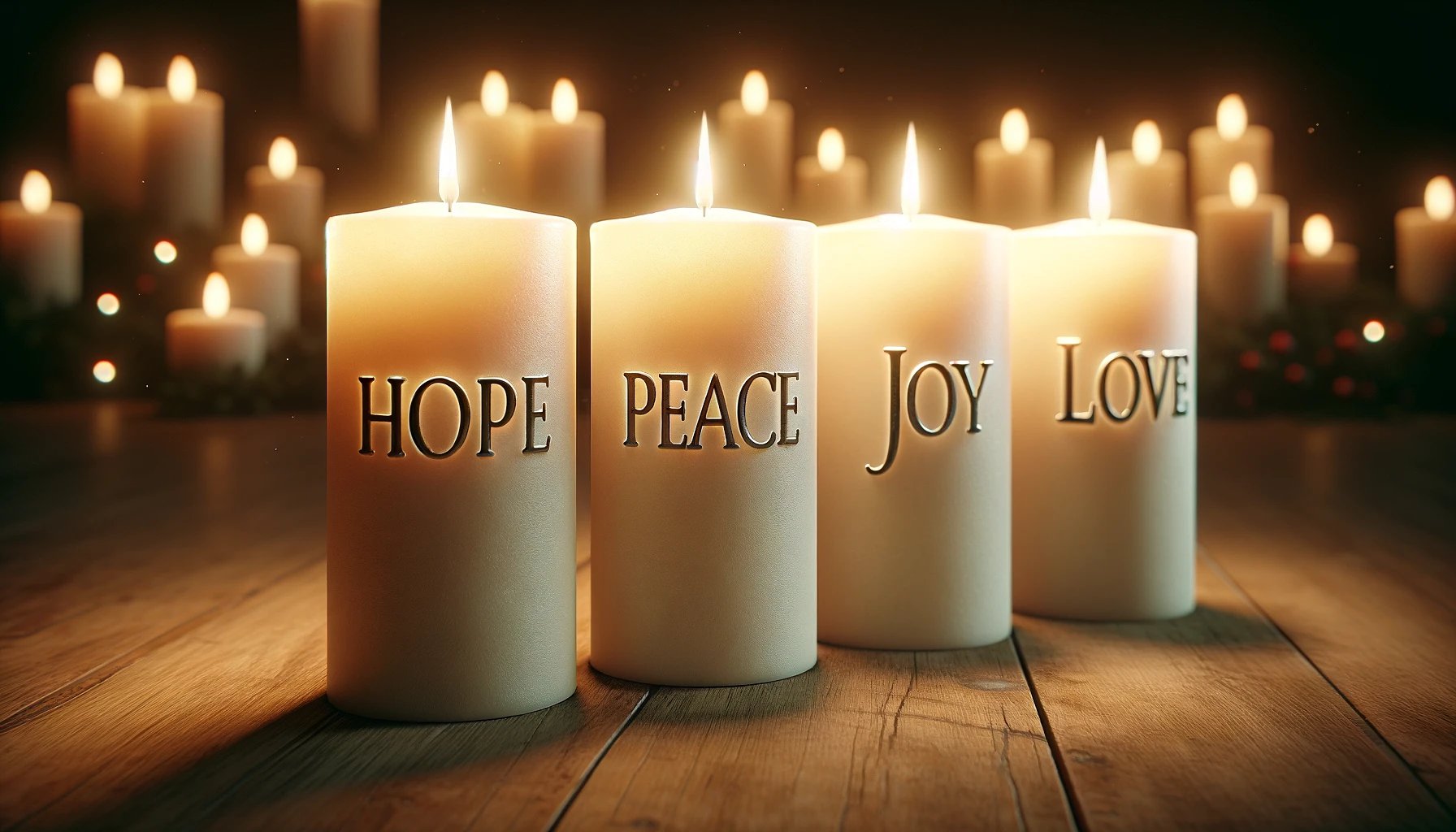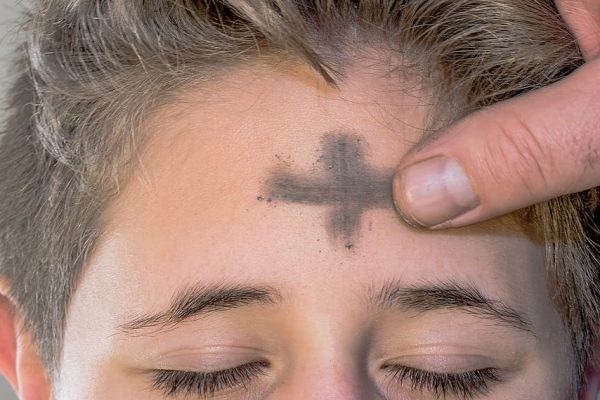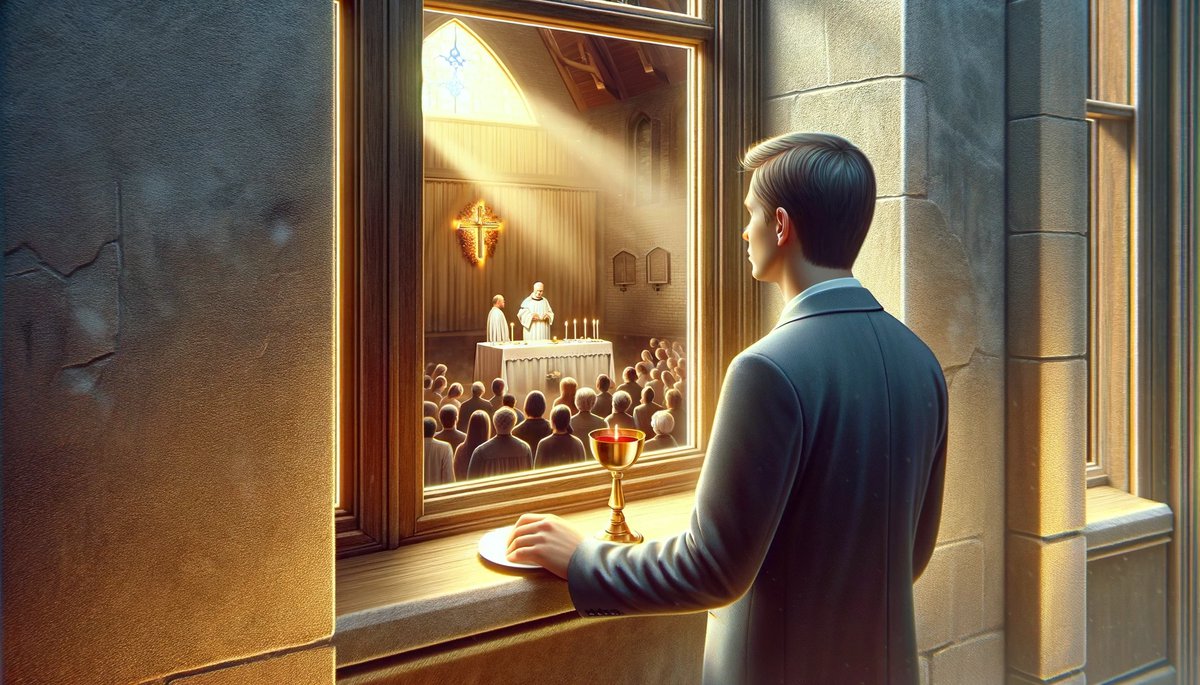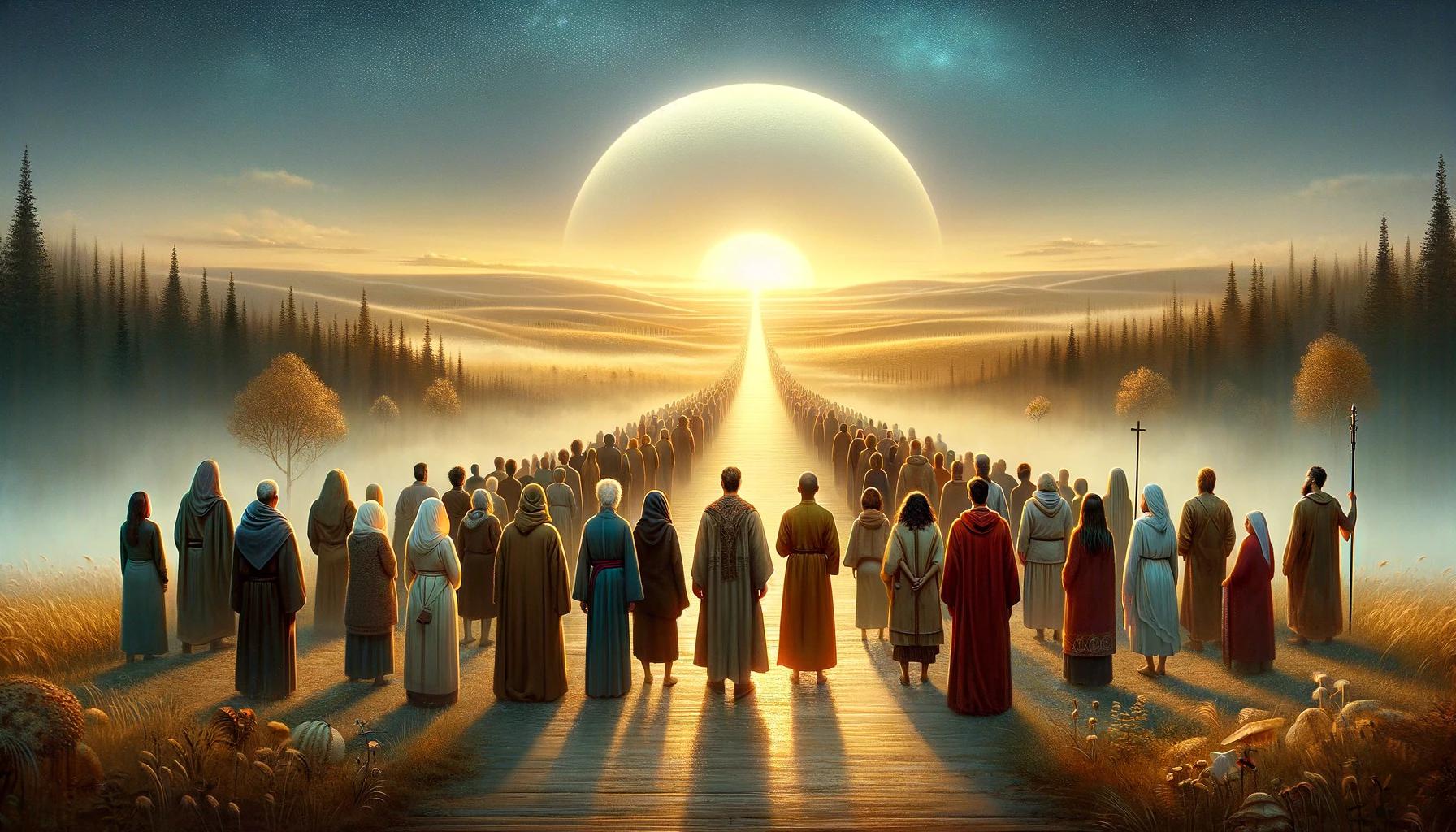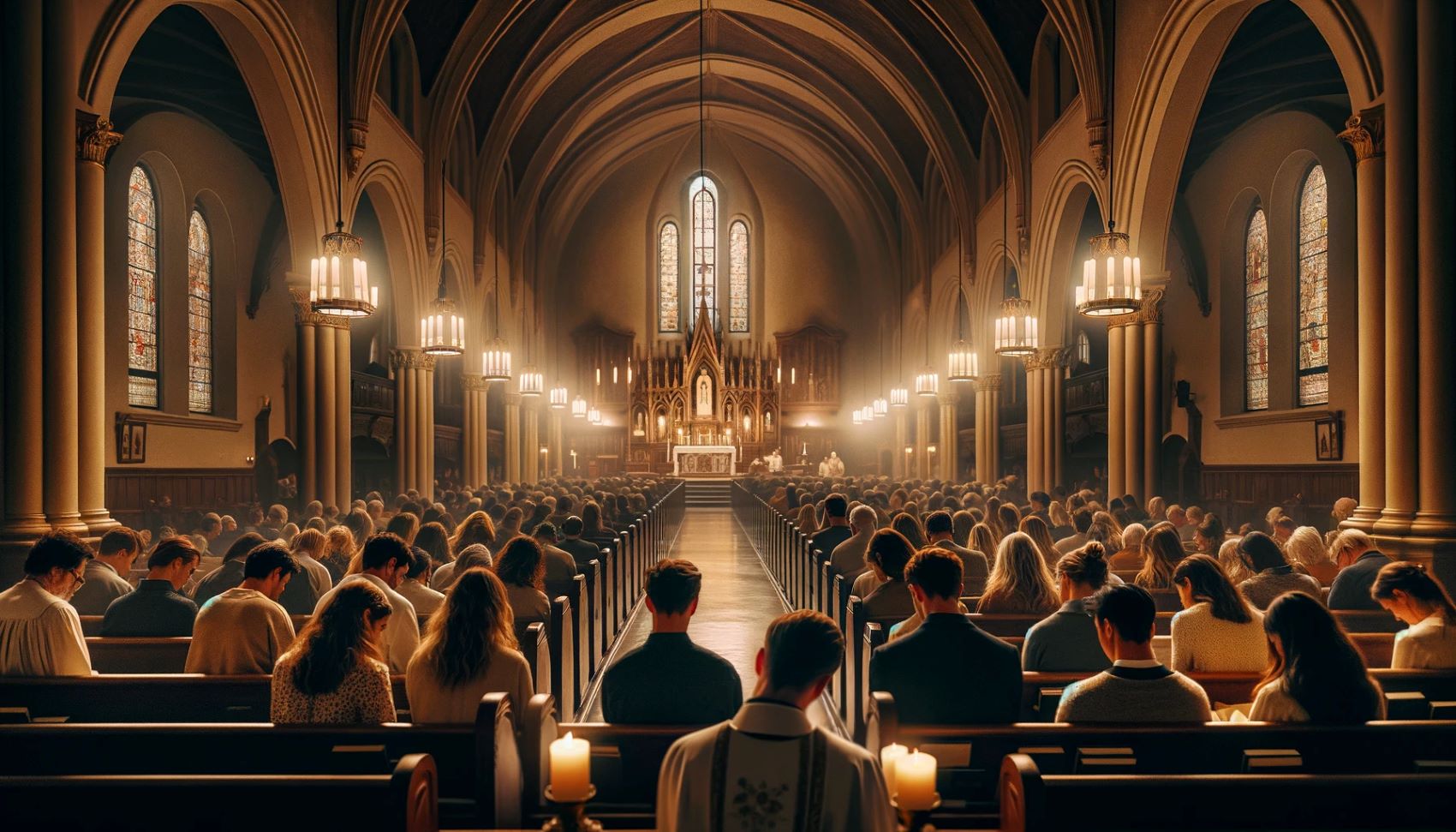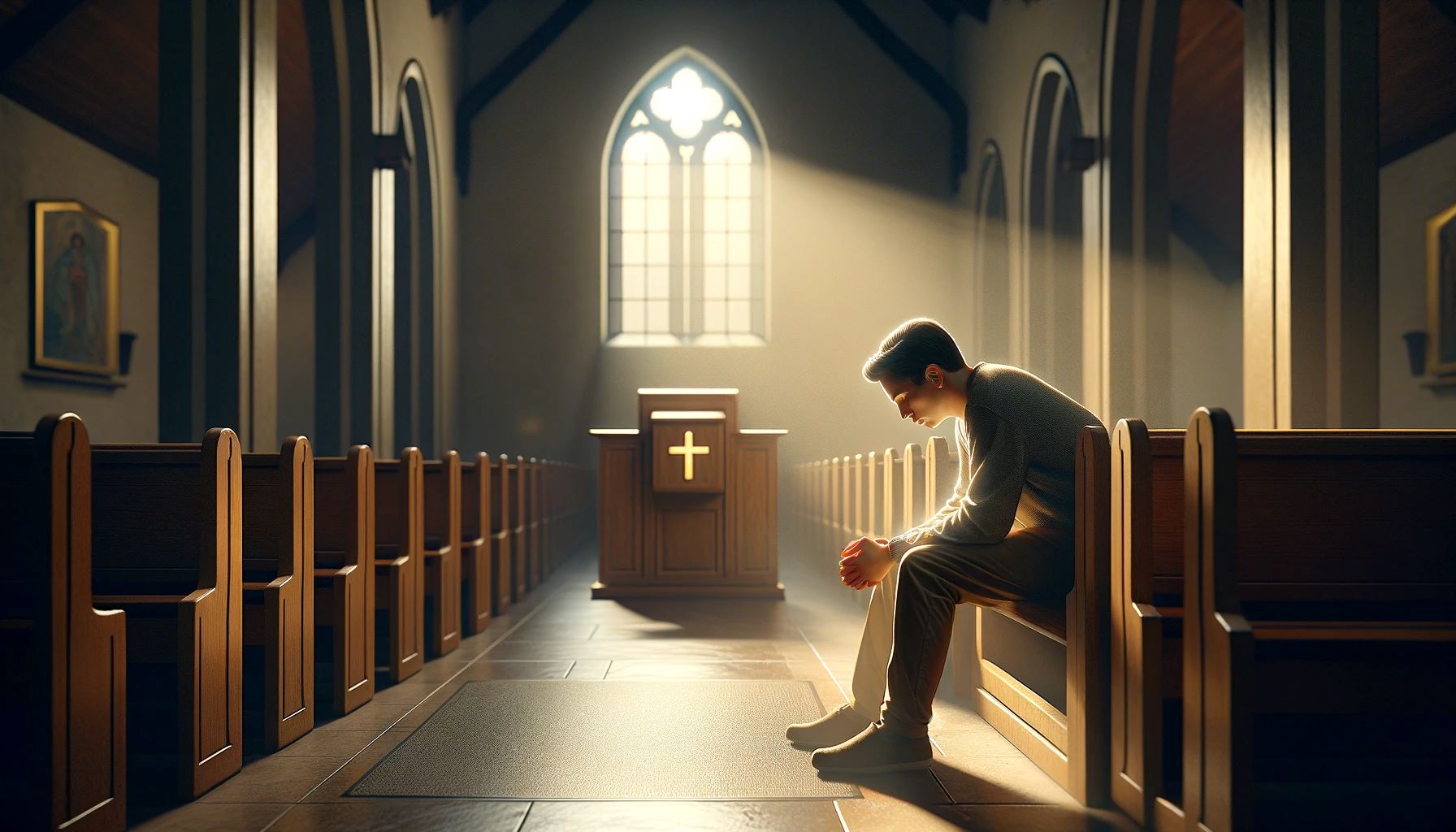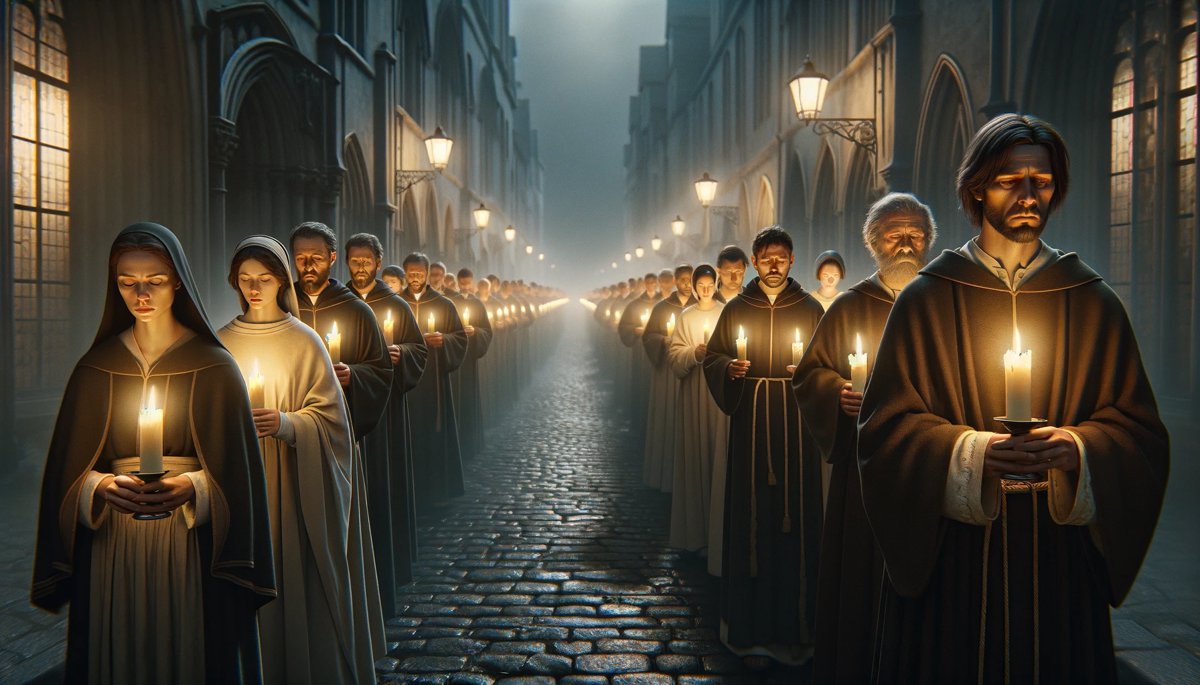Home>Christian Resources>What Is Maundy Thursday and Why Should We Celebrate It?
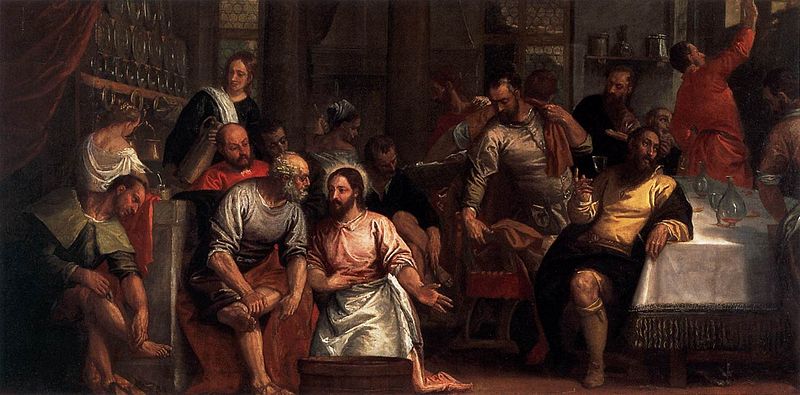
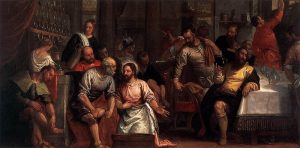
Christian Resources
What Is Maundy Thursday and Why Should We Celebrate It?
Modified: January 9, 2024
Ericka Andersen, an editor at Christian.net, expertly merges digital strategy with content creation, focusing on faith and societal issues. Her communication skills enhance the platform's engaging narratives, fostering meaningful dialogue on belief's impact on society.
Maundy Thursday reminds us of Jesus’ new commandment. Learn more about this mandate and the significance of Maundy Thursday.
(Many of the links in this article redirect to a specific reviewed product. Your purchase of these products through affiliate links helps to generate commission for Christian.net, at no extra cost. Learn more)
Good Friday and Easter Sunday are the highlights of the Holy Week celebration. These events commemorate the crucifixion, death, and resurrection of Jesus Christ. But, do we know what happened the night before Jesus faced his death for the completion of God’s salvation plan? Maundy Thursday plays a major significance during the Holy Week. It is the night where Jesus celebrated the Passover with the disciples. Other than that, Jesus gave a mandate to them that also applies to us at present; He had his last supper with them. Learn more about Maundy Thursday as we discuss all the things you need to know about this significant day.
What is Maundy Thursday?
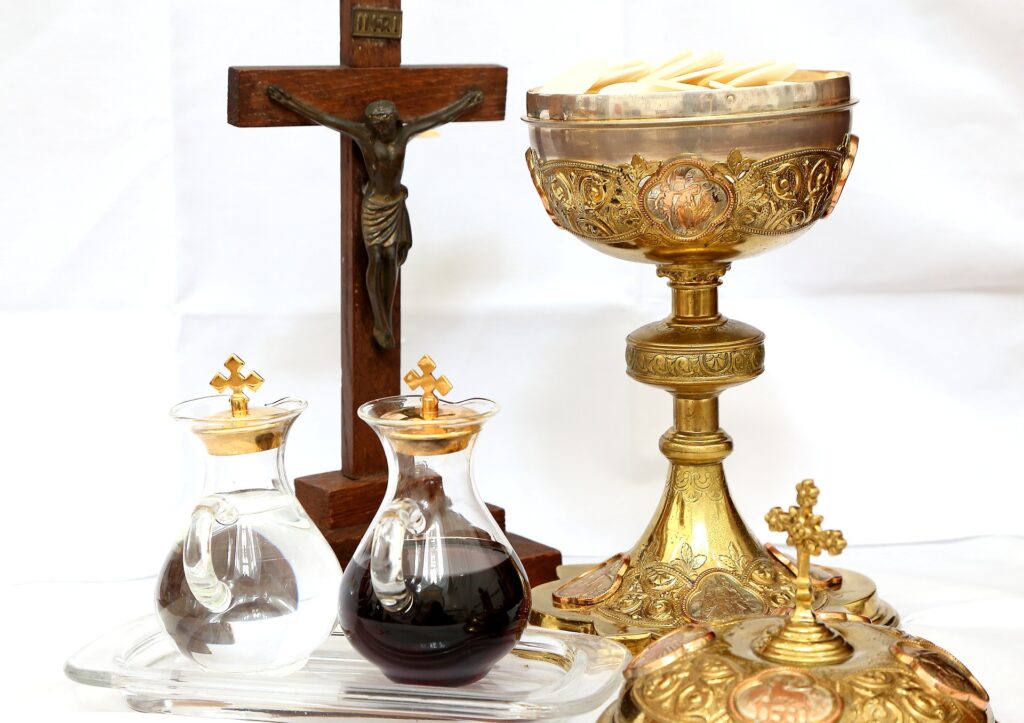
Image by James Chan from Pixabay
Maundy Thursday, also known as Holy Thursday, Covenant Thursday, and Great and Holy Thursday, is the Thursday before Good Friday. It is the start of the Paschal Triduum, a period of three days starting on the evening of Maundy Thursday until Easter Sunday. This day commemorates the Washing of Jesus’ disciple’s Feet and the Last Supper of Jesus Christ with his disciples. It is believed to be the day when Jesus celebrated his final Passover with them in the Upper Room or Cenacle.
The word ‘Maundy’ from Maundy Thursday is an Anglo-French word that came from the Latin word ‘mandatum’ (or mandatum novum). It means commandment or ‘a new mandate’. It refers to the New Commandment Jesus gave the disciples, which is to love one another as he loved them (John 13:34).
Though the services vary, most Christian churches commemorate Maundy Thursday. One of the ancient Christian practices to celebrate Maundy Thursday is the Holy Communion or the Eucharist. Some churches celebrate Sacrament as part of an evening meal in a less formal setting. The church sanctuary reminisces the setting of the original Last Supper. Other churches also observe the washing of the feet, which they reenact Jesus’ humble act of service toward his disciples.
Read more: What Is Maundy Thursday In Lutheran Church
Jesus Washes His Disciples’ Feet
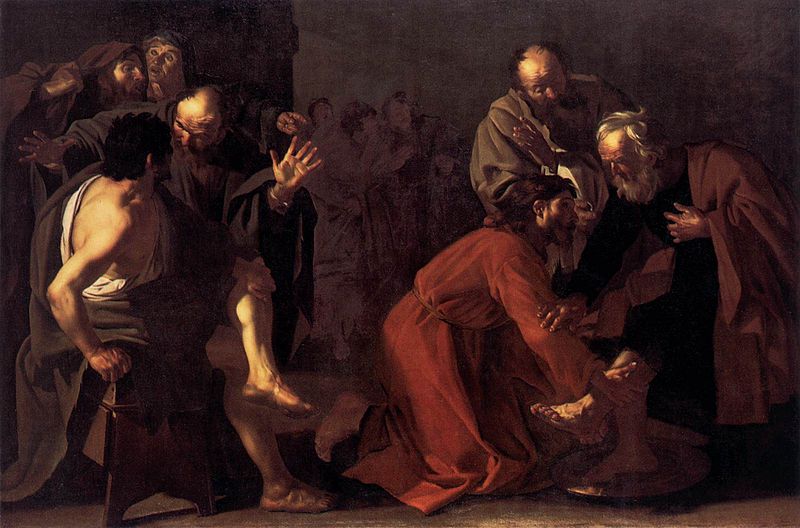
Image from Wikipedia Commons
One of the highlights we commemorate during Maundy Thursday is the washing of the feet. This event is significant as Jesus taught the disciples what it is to serve with humility and love.
According to the Old Testament, washing of the feet was the first act upon entering a tent or a house after a journey. For ordinary people, the host provides the water, and the guests wash their feet on their own. For the rich, the house servant or the slave carries out the job to wash the feet of the guest. It is considered as the lowliest of all services. Teachers were seen as a person of higher status than his disciples. So, teachers would never wash the feet of his disciples. By washing the feet of his disciples on Maudy Thursday, Jesus was humbling himself and making his disciples equivalent or of higher in status than himself as their Rabbi. Before Jesus’ crucifixion and death, he was a model servant and showed this servant attitude through his actions toward his disciples.
John 13:1
It was just before the Passover Festival. Jesus knew that the hour had come for him to leave this world and go to the Father. Having loved his own who were in the world, he loved them to the end.
On that night, Jesus was fully aware that one of his disciples will betray him, and one will deny him. Jesus also knew that his disciples will desert for a time; during his trial and death. Still, Jesus loved them just as God loves us.
John 13:3-5
Jesus knew that the Father had put all things under his power, and that he had come from God and was returning to God; so he got up from the meal, took off his outer clothing, and wrapped a towel around his waist. After that, he poured water into a basin and began to wash his disciples’ feet, drying them with the towel that was wrapped around him.
Jesus rose from the table and wrapped his waist with a towel like the lowliest servant would do. Then he washed and dried the feet of the disciples. The disciples were most likely stunned at Jesus’ act of humility and condescension when he washed their feet. However, Jesus came to earth not as a King or Conqueror but as a Servant (Isaiah 53). Jesus explained to his disciples that he came to the world not to be served but to serve (Matthew 20:28). He taught his disciples that they should have a willing heart and attitude to serve, for this attitude will glorify and honor God.
John 13:6-9
He came to Simon Peter, who said to him, “Lord, are you going to wash my feet?” Jesus replied, “You do not realize now what I am doing, but later you will understand.” “No,” said Peter, “you shall never wash my feet.” Jesus answered, “Unless I wash you, you have no part with me.” “Then, Lord,” Simon Peter replied, “not just my feet but my hands and my head as well!”
Peter was bewildered when he saw his teacher washing his disciple’s feet. He couldn’t comprehend Jesus’ teaching that to be a leader, a person must be a servant and practice humility.
Read more: Why Do We Celebrate Advent?
John 13:10- 11
Jesus answered, “Those who have had a bath need only to wash their feet; their whole body is clean. And you are clean, though not every one of you.” For he knew who was going to betray him, and that was why he said not every one was clean.
Previously, Jesus explained to Peter what humility is and showed him how to be humble. The feet of a person is considered as the dirtiest part of a body as it touches the ground. Jesus was teaching about humility and having clean feet signified a clean conscience. However, he mentioned that not every one was clean because he knew that Judas, one of the 12 disciples was going to betray him. Judas was bribed with 30 silver coins to betray Jesus, so his conscience was not clean.
John 13:12-16
When he had finished washing their feet, he put on his clothes and returned to his place. “Do you understand what I have done for you?” he asked them. “You call me ‘Teacher’ and ‘Lord,’ and rightly so, for that is what I am. Now that I, your Lord and Teacher, have washed your feet, you also should wash one another’s feet. I have set you an example that you should do as I have done for you. Very truly I tell you, no servant is greater than his master, nor is a messenger greater than the one who sent him.
Jesus’ ultimate goal when he showed humility by washing the feet of his disciples was to extend his mission into the world. His disciples were to travel the world, serving God, each other, and those who received salvation in Christ. As Jesus’ disciples, we are to emulate serving one another in lowliness of heart and mind. We should seek to build one another in humility and love.
Jesus’ Last Supper with the Disciples
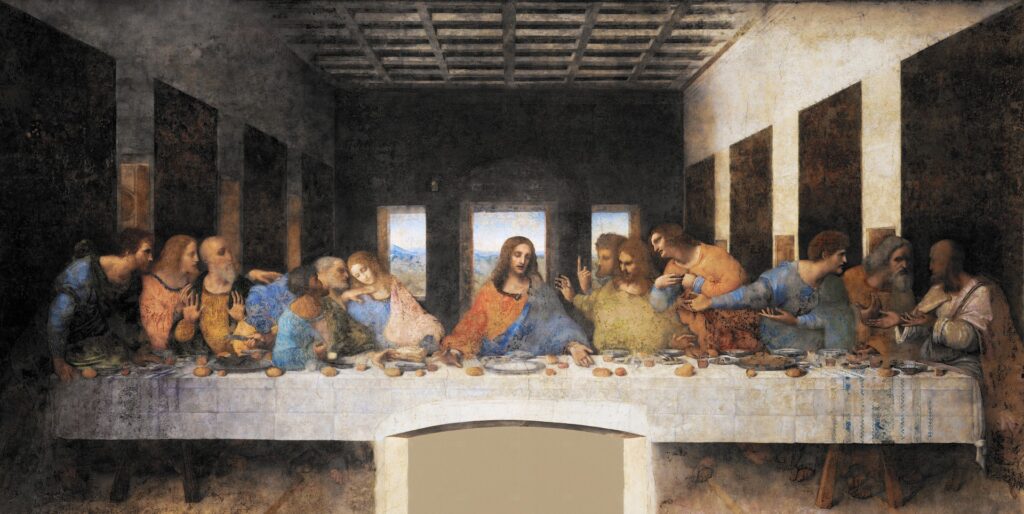
Image by 3444753 from Pixabay
Another significant event we commemorate during Maundy Thursday is the Last Supper. Also known as the Lord’s Supper, it commemorates the final Passover meal shared by Jesus and his 12 disciples. It was held in an upper room in Jerusalem on the night before Jesus’ crucifixion. The Last Supper also instituted the sacrament of the Eucharist for thanking God for Christ’s work for us. Another term used is the Communion, as we commune with God and with other believers.
Mark 14:22-25
While they were eating, Jesus took bread, and when he had given thanks, he broke it and gave it to his disciples, saying, “Take it; this is my body.” Then he took a cup, and when he had given thanks, he gave it to them, and they all drank from it. “This is my blood of the covenant, which is poured out for many,” he said to them. “Truly I tell you, I will not drink again from the fruit of the vine until that day when I drink it new in the kingdom of God.”
Jesus and his disciples ate a meal, sang psalms, read scripture, and prayed. After that, he took two traditional parts of the Passover meal, the passing of the bread and drinking of the wine. He gave a new meaning to these as a representation of his body and blood. Jesus used the bread and wine to explain the significance of what he was about to do on the cross.
Jesus’ death on the cross for our salvation creates a new covenant between God and us. The covenant in the Old Testament, people could only approach God through the priest and the sacrificial system given by God. The forgiveness of sins was done through the sacrifice of an animal (Exodus 24:6-8). However, in the New Covenant, instead of a lamb on the altar, Jesus offered Himself as the ultimate sacrifice for our sins; hence he is called the Lamb of God (John 1:29). His blood sealed the covenant between God and us. Now we can personally approach and communicate with God through prayer.
Read more: Why Do We Celebrate Lent?
The Importance of the Eucharist or Communion
Many churches around the world celebrate the Eucharist during regular services, not only during Maundy Thursday. It is important to acknowledge the significance of this sacrament because we are then reminded of Jesus’ sacrifice every week. Believers experience the presence of God by celebrating Communion together.
With this sacrament, we confess our sins and remember our need for Jesus to guide us as we accept him as our Lord and savior. It also reminds us that our sins are already forgiven through his suffering and sacrifice. Jesus paid the price of our sins in full when he shed blood on the cross for our salvation. Communion expresses our oneness in God. And it encourages us to recommit again in serving Jesus who died for us.
A Command Given To Us: Love One Another Just as Jesus Loves

Image by Photo Mix from Pixabay
The word ‘Maundy’ in Maundy Thursday derived from the Latin word ‘mandatum’. It is the first word of the phrase ‘Mandatum novum do vobis ut diligatis invicem sicut dilexi vos’. It means ‘A new command I give you: Love one another as I love you’.
Jesus said this new commandment on the night of his arrest; to love one another as he loved us. However, to love one another was not a new commandment. In Leviticus 19:18, God said to love your neighbor as yourself. However, in saying “Love each other as I have loved you”, Jesus is teaching us to have a Christ-like love towards one another.
John 13:34-35
“A new command I give you: Love one another. As I have loved you, so you must love one another. By this everyone will know that you are my disciples, if you love one another.”
When Jesus said to love others as he loves us, he was talking about showing the love of Christ through actions as he did for us. By having a Christ-like love, we will be able to help bring believers closer to God. It will also keep our faith strong and keep the church unified. Showing the love of God as Jesus did, reflects our identity as Jesus’ disciples.
1 Corinthians 13:4 – 7
Love is patient, love is kind. It does not envy, it does not boast, it is not proud. It does not dishonor others, it is not self-seeking, it is not easily angered, it keeps no record of wrongs. Love does not delight in evil but rejoices with the truth. It always protects, always trusts, always hopes, always perseveres.
To love like Christ is to love patiently, kindly, humbly, and openly. The love of Christ is not self-seeking nor hateful, but it protects and perseveres through difficult situations. Jesus’ love had all these characteristics and his command to us was to love as he did. So our love should be patient, kind, humble, and directed towards everyone, not just the people we are close to.
Read more: Why Should We Trust The Gospels
Why Should We Celebrate Maundy Thursday?
Maundy Thursday commemorates Jesus Christ’s institution of the Eucharist during the Last Supper. It also remembers the washing of the feet of his disciples. Why should we celebrate it? Because it reminds us of Jesus’ new mandate not only for his disciples but also for us. He calls us to love with humility by serving one another and to remember his sacrifice. By showing us how to love and loving us unconditionally, Jesus set a new and higher standard for love. For his disciples, Jesus sacrificed himself to meet their deepest needs. He gave his disciples the forgiveness of sins, leading them to a new spiritual life.
Remembering Jesus’ act of service and his new commandment isn’t only during the Lenten Season but on a daily basis. But, this season helps us to understand and reflect more on this deeply along with other believers. It makes us open our hearts and recommit into serving others with a Christ-like attitude.
How do Christians Celebrate Maundy Thursday?
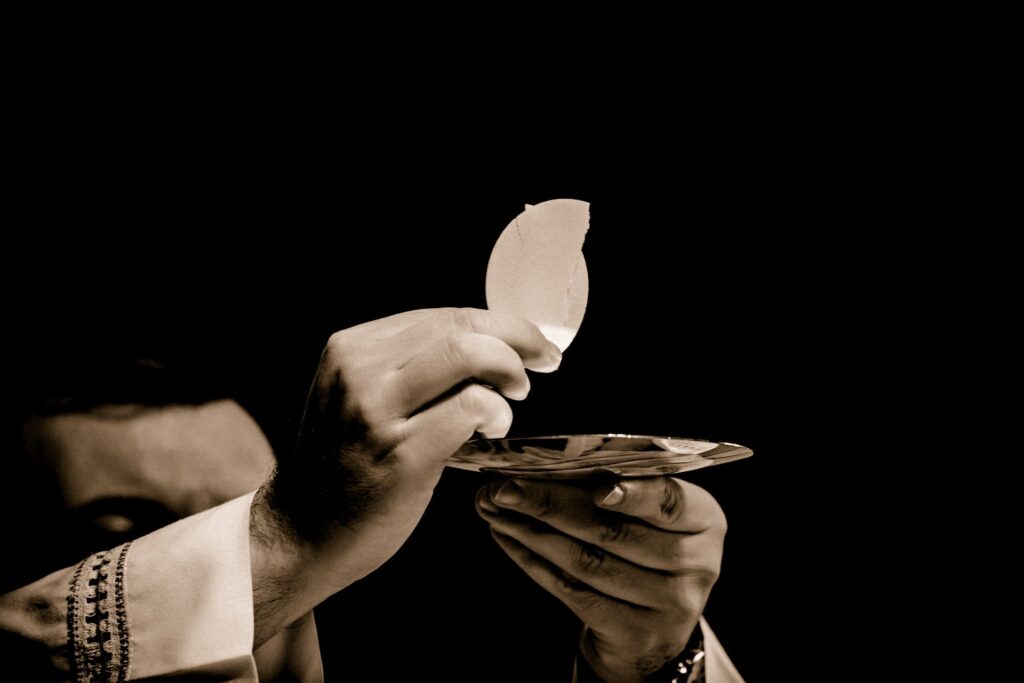
Image by Robert Cheaib from Pixabay
Different Christians around the world have various ways on how they commemorate Holy Thursday. Most churches conduct services, mass, vigils, and liturgies. Some also follow certain traditions, such as the washing of the feet and celebrating a Chrism Mass. Here are the ways on how Christians in different parts of the world observe Holy Thursday.
Western Christianity
Western Christianity usually conducts services to observe Holy Thursday. It includes Washing of the Feet, a traditional religious rite practice by the hierarchy of the Roman Catholic Church and some Protestant Churches. It imitates the humility and selfless love of Jesus when he washed the feet of his disciples.
The Mass of the Lord’s Supper begins as usual in other churches such as the Catholic Church. After the homily, the priest who is leading that Mass may perform the act of the washing of feet. In Catholic Mass, the Blessed Sacrament or Communion remains until the service concludes. It ends with a procession taking it to the Place of Reposition. In other Christian denominations, leaders of the church clear the altar and other items on the chancel to prepare for the Good Friday service.
For the Roman Catholic, Lutheran, and Anglican churches, they hold a solemn Chrism Mass on Maundy Thursday. It is one of the most solemn and important liturgies of the liturgical year. Aside from that, it is often the largest annual gathering of the clergy and is faithfully held in most dioceses. During Mass, the attendees renew their baptismal promises. Also, the priests, ministers, and deacons will reaffirm their ministries by renewing the vows made at their ordination.
Eastern Christianity
The liturgical colors are brighter in the Eastern Orthodox Church. The common color used is white. Every Maundy Thursday, the fast is relaxed to allow the consumption of wine and oil. The primary service for this day is Vespers, a term used by some Protestant denominations for evening services. The service is combined with Liturgy of St. Basil the Great, which read the first Passion Gospel. In some cathedrals, the ceremony of the washing of the feet is normally performed.
After the liturgy, they change all the hangings and vestments to black or other dark colors to signify the beginning of Passion. There is also a Holy Passion service, before the Friday morning, which focuses on the Twelve Gospels. These readings contain Jesus’ last instructions to his disciples. It also includes the prophecy of the cross, Jesus’ prayer in the Garden of Gethsemane, and his new commandment.
Read more: Why Should We Follow Jesus Christ
Traditional Customs Performed During Maundy Thursday
Tenebrae
Many churches observe the ancient religious service of Tenebrae, a Latin word for candles. This service of candles is accompanied by various readings of scripture. The gradual extinguishing of candles cast shadows of the cross in different dimensions on the walls. Eventually, the worshippers are left in total darkness for a minute. This darkness signifies the death of Jesus.
Washing of the Feet
Most churches include the washing of the feet as an integral part of Maundy Thursday’s evening services. It reminisces Jesus’ washing the feet of his disciples in the Upper Room during the Last Supper. It shows his humility, love, and service.
Covering of the Statues and Crucifixes
Some churches are covered during the Passion Time (or the last two weeks of Lent). The crucifix covers are allowed to be white instead of purple for Holy Thursday.
Read more: Should Christians Celebrate Halloween?
Maundy Money
In the United Kingdom, the Maundy Thursday celebrations include the Monarch. This tradition started during the Era of Queen Elizabeth I. These coins, known as Maundy money (or Royal Maundy), are distributed in red and white purses. The red purse contains regular currency, given in place of food and clothing. On the other hand, the white purse has money for one penny for each year of the sovereign’s age.
Remembering Maundy Thursday
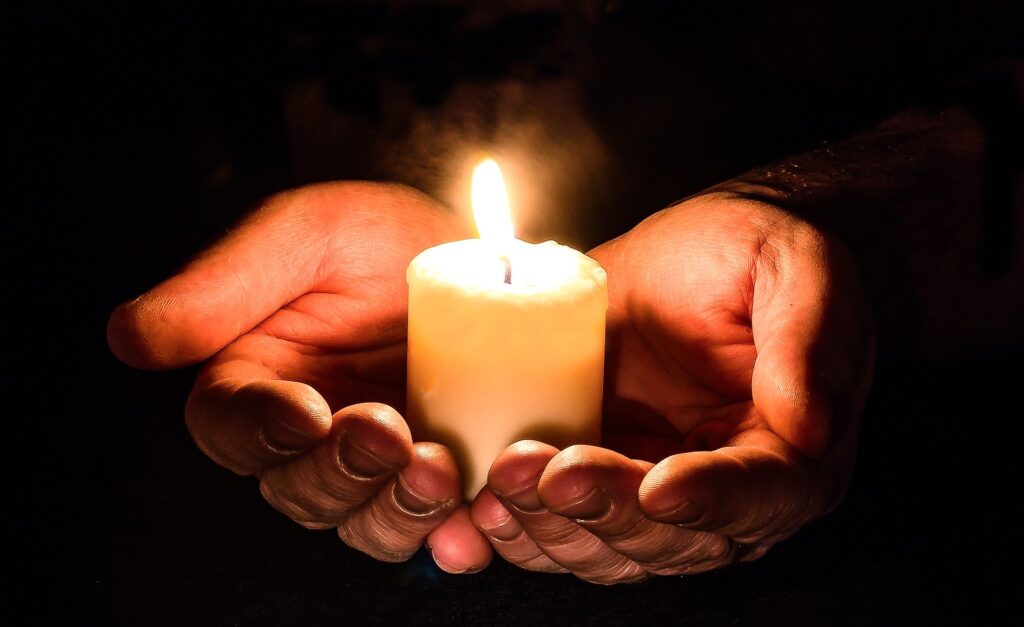
Image by Myriam Zilles from Pixabay
Maundy Thursday also holds significance as important as Good Friday and Easter Sunday. It is a religious event that allows us to remember what took place during the night before Jesus was crucified. Jesus’ parables and actions teach us to show others the same love we received from him. This is the message of Maundy Thursday. Whatever we do during this day, we should always remember the ultimate reason why we commemorate this. As Christians, we should let Jesus live in our hearts and have a Christ-like character.


